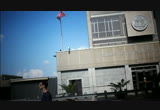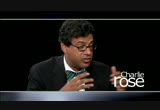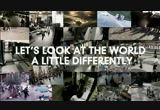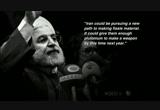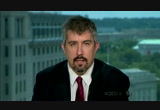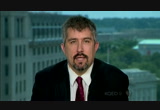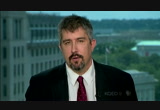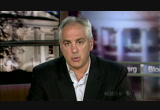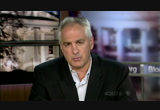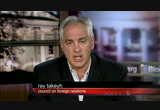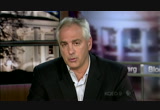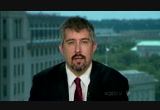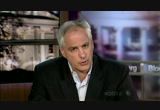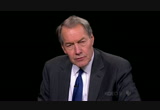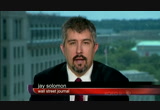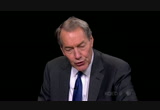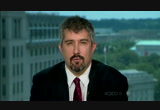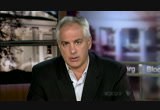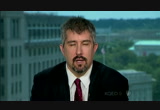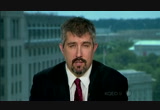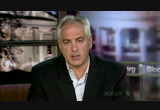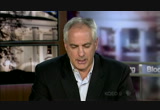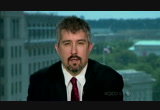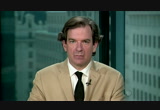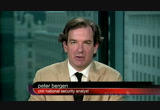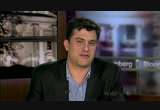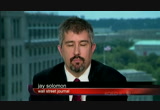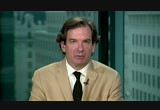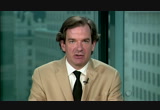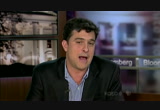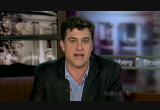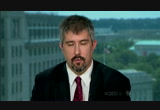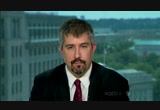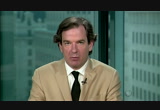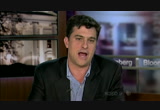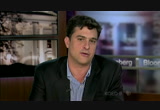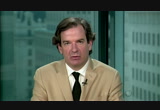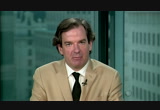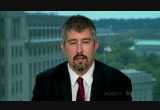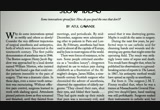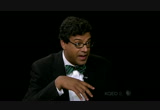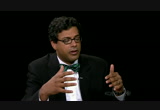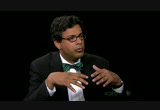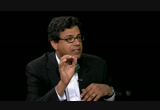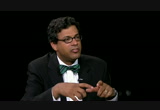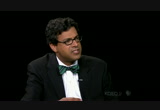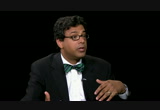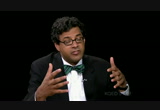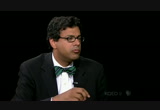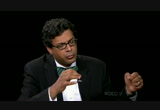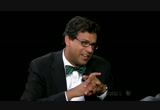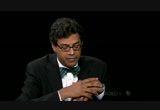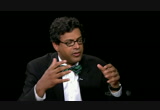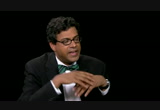tv Charlie Rose PBS August 6, 2013 12:00am-1:01am PDT
12:00 am
program. we begin this evening with a look at the new iranian president. joining me jay solomon of the "the wall street journal" and ray tack yea of the council on foreign relations. >> he seems more flexible and more pragmat anything terms of his dispositionment but again hasan rouhani is coming to the scene at a time when iran has a fairly mature nuclear program is so in 2003 when he was wrestling with this issue, he was attempting to maintain options that iran did not yet have. today he's trying to preserve what it actually does have. and advance the program. >> rose: we continue this evening by looking at the threat of a terrorist attack. joining me mark mazzetti of the new york time, peter bergan of cnn and continuing with us jay solomon of the "the wall street journal". >> now you know one of the questions that has come up in the last two days is the obama administration has claimed that al qaeda is in deep trouble. i think that claim is true. and they're kind of-- but
12:01 am
they're also saying if the organization is if deep trouble why did we just close 22 embassies and consulates in 17 different countries. and i think both statements are true. i mean an organization that is in deep trouble can still talk to each other and make threatening statements that we pick upment does it mean that they're operationalizing something, does it mean they have the capability, that's a whole different question. and as a factual matter the last time they attacked successly in the west was july 7th -- 005 in london. >> rose: we conclude with dr. atul gawande who wrote an interesting piece in the "new yorker" magazine about innovation. >> the most intriguing question in my mind is health care has been about the individual doctor and their brilliance for the last half century, where we've had knowledge and capabilities. but now the knowledge and the capability has outstripped what our own, any one of our brains as doctors can hold in our head any more. our own skills will never be perfect enough.
12:02 am
and we can't hold on to all the knowledge. so now it's teams. i call it going from a world of cowboys to pit crews. and it's such a fundamental change. >> rose: the new iranian president, the possibility of a terrorist attack, and atul gawande on innovation when we continue. >> funding for charlie rose was provided by the following: additional funding provided by these funders:
12:03 am
captioning sponsored by rose communications from our studios in new york city, this is charlie rose. >> rose: iran's new president was sworn in this weekend. hasan rouhani a political moderate was the surprise win never june's presidential elections. he replaces iran former leader mahmoud ahmadinejad. however open that rouhani might be more willing to negotiate over iran's alleged nuclear weapons program has been complicated by recent news. as jay solomon reported in "the wall street journal," iran could be pursuing a new path to making material. it could give them enough plutonium to make a weapon by this time next year. jay solomon is a foreign affairs correspondent for "the wall street journal." he joins me now from washington. also with us in washington
12:04 am
ray takeyh, he is a senior fellow for middle eastern studies at the council on foreign relation. i welcome him back as well. so tell me, jay, about this. what is it that they have that may be a faster path to a nuclear capacity? >> they're constructing a heavy water reactor in the northwest in a town called iraq, arak. and in some ways it's not new. i think in 2004 they started construction and as far back as 2006 the u.n. security council passed a resolution telling the iranians they had to stop. what's alarmed. aiea, u.s. and europeans in recent, kind of last three or four months is that iranians have been saying we're going start testing this facility by the end of the year this year. and we're going to start introducing nuclear materials into it by next summer. so conceivably i don't think they could actually start extracting plutonium
12:05 am
immediately. but once you start firing up that reactor, you are producing weapons-grade plutonium. and you know everyone has been focused so much on the enrichment facilities that the iranians have been building which are vast. but the plutonium producing heavy water reactor is the path that india and pakistan used to produce their first atomic weapons. and the north koreans also used the plutonium from a reactor. so everyone has been so fixated on the enrichment facility. and here the iranians are now saying we're going to fire up this heavy water reactor by next year. and i've been struck a bit by talking to some of the israelis. because you know, they've been threatening-- netanyahu has been threatening and i think some people have become, you kind of become enured to it. but they've twice in their history have blown up reactors just before they became operational. and the israelies will say once the materials are introduced to the reactor it's too late. so if there's going to be a strike, they would have to
12:06 am
do it before the materials are introduced which the iranians would say is sometime next summer. so it's a dangerous other path. and the negotiations, all of the nuclear diplomacy has been so focused on the enrichment, suddenly now you have the iraq heavy water reactor emerging and you know there is a real fear that that could be another path to a weapon. >> rose: what would be the time line for a, the other process wince mean if it started up next year it could start producing plutonium immediately. and the estimates are that it would produce about two bombs worth of weapons grade plutonium a year. then it gets very technical. some people said it could take another year before they would yield enough, maybe another year and a half before they produce enough plutonium that would be usable in a bomb. and they would also have to have a processing facility to actually you know harvest the plutonium from the
12:07 am
reactor which as far as the iaea knows they haven't built yet. but a lot of the stuff they have done over years has been secretive. so you know, the start date would probably be sometime mid next year. there are actual, the extraction of plutonium could be another 18 months after that. i think that would be the most accurate time line. >> rose: what do you know about this, ray? >> well, i mean, i think it has come as jay suggested, somewhat of a surprise. even though it shouldn't have been, because everyone has been concerned about the totality of iran's nuclear program. but as jay suggested, so much effort and so much of the thinking about iran's program has focused on this enrichment capability, for justifiable reasons. that enrichment capability is growing and is quite sophisticated and is advancing in terms of quantities produce, gradation of uranium enriched and the centrifuges introduced. but suddenly we have this whole new dimension to iran's nuclear production that would be subject of negotiations and subject of
12:08 am
some sort of restrictions. >> rose: do you assume that there's any difference in iran's nuclear program and decision-making because they have a new president? >> well, i mean to be fair to president ahmadinejad and at times one has to be fair on his behalf, he did want a nuclear arms control agreement. particularly since 2009 when he was of such diminished legitimacy at home that he was hoping for some sort of a triumph abroad but he couldn't get there. he did negotiate the brazil-turkey deal that fell apart in may of 2010. so he was attempting to have a nuclear agreement with the united states, rather desperately. but he just couldn't push it through the system. now hasan rouhani comes with some degree of advantage because he's a president that essentially campaigned on the issue of dealing with the west with a better tone and better style. but he would have to have-- he would confront the same sort of an obstacles.
12:09 am
he has to essentially go through the system and attempt to negotiate first with the iranians, and then with the international community as represented by-- . >> rose: i never quite understood why the u.s. turned down the turkey-brazilian aspect of that? why did they? >> well, i think there were a number of aspects of the turkey-brazil deal that the united states felt were inadequate. for instance there was acknowledgment of iran's enrichment. iranian was maintain the possession of those nuclear resources that they ship abroad, as opposed to being under the custody of the aiea. there were a number, the administration, about nine, ten objections to the turkey-brazil deal. to be fair to the administration, they were prepared to negotiate that with the turkish and braz yell-- brazilian representatives as well as iranians. but once that agreement in its entirement proved unacceptable not just to the united states but to the other members, it fell apart. >> rose: let's talk about what we expect were ry
12:10 am
ryu-- rouhani. all this talk about being a moderate, what does that mean in his case, other than tone? >> well so, far we have seen much of the tone. i would have to say in the past ten years when he's been outside government he's actually been fairly lucid and thoughtful in terms of his criticism of the negotiating style of the iranian government. he seems more flexible and outlook more pragmat anything terms of his disposition. but again, hasan rouhani is coming to the scene at a time when iran has a fairly mature nuclear program. so in 2003 when he was wrestling with this issue, he was attempting to maintain options that iran did not yet have. today he's trying to preserve what it actually does have, and advance the program. so far the only thing that he's promised that is tangible is greater degree of transparency. not necessarily dismantling any aspect of the program. but making it subject to greater degree of international scrutiny and therefore international confidence. that is unlikely to be
12:11 am
unacceptable to the five-- who actually are looking to the united states and others for iran to actually retract some of its capabilitiesment so all this has to be kind of worked out if it can be worked out at all. >> rose: jay? >> i think one of the interesting things, just watching rouhani since the election and his comments in the last couple of days is he has really linked iran's economic woes to sanction relief in a very, you know-- ahmadinejad would sort of say at times he kind of would say we're having some problems. but the message usually was we're going to get passed this. we're become morning self-sufficient. rouhani has taken a very different position, and really acknowledged that they are hurting. and that the nuclear, the sanks from the nuclear program are the reasons. so that is an interesting new dynamic and some of the people he put in his cabinet or he has nominated that still need to be approved by the parliament do have, there are a lot of technocrats that are seen as more expert in the economy. there is the new foreign minister who spent a lot of
12:12 am
time in the u.s. so there does seem to be a new dynamic which is going to make the five plus 1 process pretty interesting in the next three so six months because i don't think they'll have that much time to at least show some progress to keep both sides domestic situations under control. >> if i can say one thing. there is always considerable degree, more continuity in the united states and iran's approach to each other than we think. for instance, in 2008 when president obama came to power, the paradigm that the bush administration had, the two tract policy of negotiations and sanctions was largely preserved. as a matter of fact, some of the personnel were preserved as well. and i think between president khatami and ahmadinejad there were some degree of continuity and i expect some degree of continuity as well. obviously the context of iranian politics and economy has changed as jay suggested. the economy is in freefall so that may actually create a new imperative that
12:13 am
changes the dynamic and kind of disrupts this continuity that has existed in both countries approach to each other. >> rose: has it changed in any way through public pronouncements the mind-set or the position of the supreme leader? >> he seems fairly consistent, actually. he continues to harbor resentment towards the united states. he continues to be enormously suspicious of the united states. he continues to suggest that the path out of iran's predictment is what he calls resistance economy and self-sufficiency so those themes have remained the same in his case. so he's-- in that particular sense he's at osd with the pronouncement of the president or newly inaugurated president. >> so again we're getting into a situation where iranians are speaking in multiple languages. >> were you surprised that he appointed zarif as his foreign minister? >> yes, i was because there are important sectors of the conservative wing of the iranian politics that tend to be very suspicious of
12:14 am
him. they are suspicious because he has spent so much time in the united states. they are suspicious that he has embraced american mannerisms and perhaps american view of things. so he has a foreign minister that has great degree of regard in the united states, and in the u.n. itself. but there are important conservative voices that are quite suspicious of him and have always been so. >> i've been interested in the reaction in washington and europe to zarif because it's kind ever a double edge sword. on the one hand they think oh this is a guy we can deal with. we know him, he speaks our language quite well, literally. but there is also this fear that, you know, ahmadinejad was the perfect enemy in a lot of ways. he was the perfect foil. he made it very easy in a lot of ways to get sanctions and oil embargo and a lot of more pressure on iran just by, you know, the language he used, his appearanceses, his denial of the holocaust. now they have extremely sophisticated diplomats coming in who are going to make it, you know, i think
12:15 am
the real fear is the program will continue but these guys are going to be much more artful at sort of dragging thing as long andrew hani himself, you know, when he was the nuclear negotiator from 2003 to 2 o 005 made statements about, well, you know, i kind of deflected the pressure. but you know we continued on with developing the enrichment sites. i sort of protected them through the art of diplomacy. so on the one hand it's a warmer, kind of more engaging face that seems to be emerging am but i think in some ways that might make it, the actual nuclear negotiations more difficult. >> rose: much has always been said about that iran has not made the decision to go ahead with nuclear weapons. it wants to be able to make that decision but that, in fact, has not been made. what would cause them to make a decision, the capacity to do it? >> yeah, i think the most, the most accurate assumption is that they're going for the japan type model right now. they're going to have every, you know, both through the
12:16 am
plutonium path and enrichment path, they're going to have the materials. they are studied how to make weapons in the past. so you get up right to that edge and you know, i think what's been interesting with cha meni over the last six, 12 months, netanyahu as you remember, the israeli prime minister last year set a red line of 250 kilograms. and they have not breached that yet. they are staying right below it. so it doesn't seem like they want to cause a crisis on that front. but at the same time both on the heavy water reactor which we talked about and enrichment site t just keeps growing and getting bigger and becoming sort of a self-fulfilling prophecy at some point. like ray was saying, it's some of bigger than it was when rouhani was there in 2002, 2003 through 5. it is a totally different game, the negotiating strategy will have to change. >> rose: speak of iranian foreign affairs, it seems to me that he has said, the support for the syrian government will continue.
12:17 am
and the support for hezbollah will continue. and the support for other groups that have caused some concern in the west will continue. is that right, ray? >> that's right. i mean once you step away from the nuclear issue you see an entirely, kind of a very complex picture in the region. the iranians seem to think and there's evidence to suggest they're right that the region is increasingly polarizing and dividing against itself. but the basis of those division of polarities are actually sectarian. so on the one hand you have the saudies and gulf states attempting to buttress the sunni order and on the other hand you have the iranians sporting what they call the forces of resistance which happens to be hezbollah, the assad regime in syria and various palestinian rejectionist groups. so the middle east is actually being divided against itself. and iranians and saudies are in different parts of that. and the united states is actually involved in that particularly arab cold war
12:18 am
as well side well the sunni regimes as well so this is quite a polarized divided region. and the question of the nuclear issues will at some point have to be considered in the context of the politics of the region. the decisions that iranians would have to make about their nuclear issue have to do with how they see their role in the region and their power and presence in that region. and how the nuclear issue helps buttress or deflate that. >> rose: jay? >> one of the interesting things coming out of this cabinet reshuffle or the names that have been in the new cabinet, in iran, ahmadinejad is something, he had like nine ministers who were identified or seen as part of the revolutionary guard corp. which was a huge, his sort of government was seen as dominated by the irgc which most, you know, analysts, most people, diplomats dominate decision make on the syria question. so i think one of the interesting dynamics with the new government is you have a much less of an irgc formal role in the cabinet n the government. and what tensions that will
12:19 am
create going forward. if ray was talking about zarif who is not seen as having good relationship with the irgc, if he plays a big role on the nuclear front, will that cause more tensions? will they try to sabotage the syria file seems to be totally in the hands of the irgc andrew hani's comments seem consistent with what they were saying am but still that less overt role of the irgc in the next government is going to open up some interesting sort of dynamics both on syria, on the regional issue and on the nuclear file. >> rose: do we expect to see in syria just a long, protracted standoff? or do you think that there is an ebb and flow that will turn one more time against assad? >> my guess is that syrian civil war looks a lot like the lebanese civil war. that lasted some 15 years. this is essentially a confessional civil war, people are fighting for keeps. and are going to continue their struggle.
12:20 am
it will have militarily ebbs and flows in the sense that at times assad will succeed more, at times the opposition will succeed more. but i think we're in a very protracted and prolonged struggle in syria. and that struck sell likely to color the politics of the region. as i said a long sectarian lines the way lebanese civil war did not. >> rose: do you agree with that? >> i do agree with that. i think the more you look at what syria is becoming, it looks like it's going to be a balkanized state. the iranians have, you know-- you talk to rebel commanders, even journalists in the field actually see revolutionary guard military advisors on the battlefield with hezbollah fighters inside syria. they-- there are iraqi, shi'a militias who the irgc helped create to fight u.s. forces in this iraq now inside syria. and they are sort of carving out this, you know, different names for it but it's basically an assad stronghold that would encompass the coastal areas into the central regions,
12:21 am
and you know, the assad really seems to be fortifying his control over that area, some of the other regions whether it is the kurdish region or sunni areas, i think it's going to be difficult for him to reclaim them. but he's certainly strengthened his position and fortified the areas that iran finds and hezbollah find the most important because they basically control the arms into lebanon and into the front against israel. and it's hard to see that really pushing back right now without some sort of external, you know, support, more aggressively for the syrian rebels. >> rose: is there looming another israeli attack? >> i would say actually the possibility of the peace process reemerging, and the possibility of the palestinians and israeli as tempting to work out some sort of a settlement will cause further degree of iranian opposition and further support for iranians for rejectionist palestinian groups which could further entangle iran in that particular crisis.
12:22 am
now that may make it easier for israelies to decide to go ahead and strike iran because they would have additional incentives other than nuclear proliferation namely that the peace process is being scuttled by the iranian mischief as it was to a large extent in the 1990s with iran support for terrorism in jerusalem and elsewhere. so the israeli iranian relationship that has been strained primarily because of the nuclear issue is likely to be more strained if senator kerry succeeds in his effort to resume the talks in a serious way. >> rose: that say whole other program which i would love to talk about with you. but my reference was not to an israeli attack on iran but an israeli attack on the syrian facilities because they didn't get the job done entirely. >> my guess is israelis are-- have a number of red lines about iran. and about syria, jay can speak about this. number one is chemical weapons issues. number two is not having this issue seep through their boundaries, as long as the red lines are observed i think they remain reticent
12:23 am
and restrained in their current posture, the posture of reticence and confusion at the same time like everybody else's. >> i agree with that i think the israelis still don't really know exactly what they want, either the u.s. to do inside syria, what they think they should do. i know one scenario is they don't want the u.s. to get bogged down in some big operation in syria because then they would be, the u.s. would be handcuffed and unable to do anything if iran's nuclear program continues. but i think the israelis, as ray was saying they set red lines as far as transfers of missile systems or chemical weapons to hezbollah. and you know, they have done a number of hits. and i think those will continue. if they see signs that these more sophisticated weapons could be introduce mood lebanon. >> thank you, jay. thank you, ray. >> thank you. >> we'll be right back. stay with us. 19 u.s. embassies and diplomatic posts in the middle east and north african remain closed this week following warnings of
12:24 am
an unspecified threat to u.s. interests. american officials say with confidence that they have intercepted communications related to an eminent attack. the plot is believed to be orchestrated by the group al qaeda on the arabian peninsula but the details of where and when an attack might occur remain unknown. jay solomon stays with us from washington, joining me mark mazzetti, national security correspondent for "the new york times" and also a book on the cia called the way of the knife. also joining us from washington peter bergen, national security analyst for cnn and the author of manhunt, the ten year search for bin laden from 9/11 to a bad a bad. few people know more about terrorism than peter bergen and have written more and focused on it more. so i begin with him. peter, tell me, you here so many thing bses this threat. number one what does it mean that they heard a lot of chatter that was equivalent to the chatter heard before 9/11. they say it's both specific and vague.
12:25 am
and they say that op rattives have already been put on the way, in other words, have already been not only put in place, but have begun some kind of process leading to the operation. what you can tell me about what the u.s. government knows, and at the same time i know that cnn announced that, you know there are certain commitments that they have to national security that they can't tell everything that they might report at this time. go ahead. >> well, cnn is reporting this that communication between senior members of al qaeda lead to this alert. but there were other factors, obviously here, charlie. the end of ramadan, the 27th day of ramadan which was sunday, which was when all these embassies were close, as a time that al qaeda has tried to attack in the past. for instance they tried to blow up the u.s.s. sullivan off the coast of yemen january 3rd, 2000 which was the same day that year. they also, you know, benghazi, the political context here. no regional security officer sitting in an embassy that might be affected is going
12:26 am
to, you know s going to take any of these sorts of threats very seriously. so you know there are multiple reasons why this happened. there were also prison breaks in iraq and libya and pakistan, releasing thousands of inmates, some of whom associated with al qaeda and other groups that i think added to the threat environment. so you know, if you are sitting in the u.s. government office you are making a prudential decision, you know. it may be overkill. i think it probably is. and certainly it seems to have freaked out a lot of americans but if people watching this program are worried about traveling, unless they are planning a vacation in afghanistan and planning to check into a hotel next to the u.s. embassy there, they should go ahead and take that vacation. >> rose: mark? what would you add? >> well, one of the interesting things is the response to this, right. they have closed a couple dozens embassies and 19 remained open which shows that they don't really have a very clear sense about where this is going to play out. they have some sense of they
12:27 am
think timing of when attack or attack kos happen. but they have-- you know, as law make ares were saying yesterday on sunday shows it could be in europe, it could be in the middle east, it could be in south asia or the united states. they really don't know. so i think the default strategy here is being cautious, close as many embassies as possible. certainly there is the signal t looks like you're doing something. but in truth they don't have any clear idea of where this going to play out. >> jay? >> i think one thing too on the nature of the threat that has spooked people here is that qap oral quitea islamic peninsula has kind of honed an expertise on certain types of bomb making. we've seen them, you know, the christmas day plot to blow up an airliner go approximating into detroit a few years back. this use of cargo planes to try to move moneyicians into the united states. i think aqap is seen as being of the various al qaeda offshoots particularly
12:28 am
good at certain types of moneyicians or bomb making which could be deployed, you know, in europe or the united states that i think made people in the intelligence community particularly nervous with all this chatter. there is one bomb maker a saudi which works with aqap, there were some reports he had been killed in some of the drone strikes in yemen. i don't think people are totally sure. but the expertise he developed i think is believed to have lived on within this one al qaeda affiliate. and that's part of the threat that has made people really nervous. >> rose: what was his name, al cece was the last name, correct. >> so peter what you can tell us about aqap? >> well, you know the blom maker we're describing, he is 0 for 4 with the number of serious plots. he tried to kill the saudi minister of inter who is responsible for counterterrorism, tried to blow up a northwest flight over detroit on christmas day, tried to bring down cargo planes in chicago in 2010 rand a plot which was actually basically
12:29 am
intercepted by an intelligence asset of the british and saudis last year. so he's not been that successful on one level. on the other hand he is building bombs undetectable by conventional means. and the evidence is that al siri is a lism one of the few people left in al qaeda in the arabian peninsula who actually is still alive. the drone strikes that the cia and joint special operations command have employed against this group have been devastating more than 30 of their leaders an skinnier members have been killed in the last three years and lost significant amount of territory in southern yemen in 20101-- 2011. they were holding towns. they don't now. so you know, of course, you know, merely because they are wounded doesn't mean they are not capable of doing something. however they are under a lot of pressure. so the fact that people are talking about an operation doesn't mean that it's actually happening. and presumably what the government has just done has probably interrupted their planning cycle quite dramatically. >> have they told us how this traffic was intern interceptedded or is it just
12:30 am
a lot of chatter and they picked up bits and pieces from everywhere? >> well, there has been some reporting that there was intercepts between aqap, the offshoot in yemen and al qaeda members in pakistan. the sort of core al qaeda op rattives who are remaining in pakistan. there is some linkages still between these groups. although american officials have sort of pointed out that the group in yemen seems far more capability of carrying out these sorts of attacks than the traditional core al qaeda that we know from september 11th and on. so it is interesting, though, that if there are these communications, principles, between zawahiri the number one in al qaeda and aqap leaders, then it does show that perhaps that zawahiri still has some degree of control over the global organization. and that the group in yemen still would find it necessary to chat with him about what they're going to do next. so that is sort of an
12:31 am
interesting threat to keep following. as you look at the sort of changing nature of the threat. >> is there a time line on this? i mean do they think it was initiated at some point and going back to ramadan or the end of ramadan that there will be relief from this if it doesn't happen by a certain date? >> well, it's interesting. last week we were hearing about sunday, you know, yesterday as the sort of key day. and some sunday came and went in the middle east. and then you saw the state department expanding its closures or keeping 19 embassy closed through this week. so really the answer is they're not sure. they thought there may be something timed to the end of ramadan. the state department travel warning goes through the end of august. so it is anything but precise in terms of when or where for that matter. >> what other options does the united states have other than defensive measures like closing embassies? >> well, you know f they had
12:32 am
more precise intelligence obviously they would take some action. i think that's sort of what is frustrating they can take defensive measures. they can shut embassy, tell people to be vig lentz. interpol put out this warning on saturday. and then of course there's what we know about is the drone program in yemen, the drone program in pakistan. obviously they have been very aggressive still with the program so if they had specific intelligence about where a threat was materializing f it was in one of those countries could be sure that the obama administration would take action. in that case. but there is really very little to be done besides these defensive measures given how imprecise the information is. >> i was thinking another interesting element too is, we kind of talked about it earlier about this kind of sectarian divide growing in the middle east between the sunni and shi'a and some of the stuff going on in egypt. i think there is a real kind of-- people aren't really sure how is this going to play out.
12:33 am
you see al qaeda elements or groups inside syria who are fighting and getting hard at fighting at sad regime. a resurgence inside of iraq in al qaeda in iraq elements fighting its government and shi'a groups inside iraq. and now you have this suppression of the muslim brotherhood inside egypt and i think the fear is if they crack down too much, it's going to explode in other ways, this islamist card inside egypt and there has been some murmurings from more radical groups about retaliation. so the plots that have been uncover ready coming in much broader kind of context of a lot more instability even than 9/11 as far as sunni-shi'a violence or interarab conflicts. and that makes it a much murkier situation as well. >> rose: we found after the boston marathon that there were these people prepared to engage in terrorist activities, that were homegrown that were here, living embedded somewhere in the united states, in the fabric of communities or in
12:34 am
other places. is that a looming threat that they worry about in a circumstances like this? >> you know, i mean there is good news and bad news about lone wolves which the boston brothers appear to have been. you know, they don't seem to have had any links with a formal organization. the bad news is they're hard to detect. the good flus is there is a natural sealing to what they can do. if you think about the flooin nine plot it involved 19 high back jackers, training camp in afghanistan, it involved money transfers from dubai t involved sort of command and control from people in germany. it was a very complicated plan. and you know, lone wolves can make bombs. one of the reasons you know boston could have been much worse if these guys had got their hands oned kinds of chemicals that could create really serious bombs but it's very, very hard to get those chemicals in the united states. if you purchase a nonnumb-- a munium nitrate or other chemicals you attract a lot of attention it is a problem, a problem
12:35 am
unlikely to go away. there is always some disaffected young man somewhere that buy into bin laden ideology that the war against islam is lead by the united states. but deend of the day, it is, you know, to me that's-- these people are capable of creating tragedies but not capable of creating catastrophes as we saw on 9/11 so there is a sort of silver lining in the lone wolf cloud also lance's the assessment of the obama effort against terrorism considering the impact of the drones and other things? >> starting around christmas day 2009 when its al qaeda in arabian peninsula was fairly close to detonating a bomb in an airliner over detroit, you started to see ot bama administration really sort of wake up to this threat and really become very, very aggressive after that, especially in 2010. so you saw a really an expansion of the drone program that embraced a lot of the tools that president
12:36 am
bush had started. so what we have seen is a very aggressive posture, again in pakistan and yemen, parts ofafter qa in terms of carrying out these offensive counterterrorism operations with some blowback, with some backlash in these countries. it should be said. so you know, the obama administration would point to successes that, you know, you have not seen a large scale attack on american soil carried out by al qaeda. and that's the ultimate sort of grade they should get is for preventing any of these kinds of attacks. but certainly i think how aggressive obama has been in certainly his first term, i think we'll see in the coming years just sort of how much of a radicallizing affect that could have in these countries where they've been particularly aggressive. >> rose: pet per, the so-called treasure trove of material they found in abbottabad,s that paid off? >> you know, i mean that was now, two years ago. i think certainly in the immediate short term we saw
12:37 am
picking up on mark's point about the drone program in pakistan, after bin laden was killed, the number of his top leaders were relatively quickly killed in drone strikes and in fact one was even arrested. and some and a half information i'm sure must have come out of the treasure trove of documents. 17 have been publicly released and going to the big picture question of where was al qaeda, the documents paint a picture of an organization that well understood it was in deep trouble. the drone program was decimating its leadership. bin laden was thinking about actually moving his group to a part of eastern afghanistan that is heavily mountainous and heavily forested and therefore difficult to kind of lock at from above with a drone. he was advising his son to leave pakistan. i mean he well knew the organization was in deep trouble. now you know one of the questions that has come up in the last two days is the obama administration has claimed that al qaeda is in deep trouble. i think that claim is true. and they're kind of-- but
12:38 am
they're also saying well, if the organization is in deep trouble y did we just close 22 embassies and consullates in 17 different countries. and i think both statements are true. i mean an organization that is in deep trouble can still talk to each other and make threatening statements that we pick up. does it mean that they're operationalizing something. does it mean they have the capability, that's a whole different question and as a actually matter the last time they attacked successfully in the west is july 7th, 2005 in london. al qaeda or one of its associated groups. so you know, their record is not a record of great success. you know, so i counciled i think the government has done the right thing because that, as a government you are responsible for your employees and your citizens. but does this mean that al qaeda is having some sign of deathbed res direction i'm very skeptical. >> some have argued that this shows you that the material that edward snowden disclosed did not prevent
12:39 am
the united states from learning of syria's issues that might threaten it. >> yeah. i mean i think-- it's a very good point to be made. because in the initial, in the days after snowden's disclosure first came out you heard some officials either on the record or in background talking about how much damage had been done and how terrorist basically fundamentally changed all of their communications patterns as a result of some of these programs getting exposed. but it is clear from the last couple days that the united states still has capability to do this electronic monitoring, eavesdropping. the nsa hasn't been totally kneecapped in terms of its capabilities. so i think it is an important point to keep in mind. >> it's also become quite political. yesterday on the sunday talk shows you could see a lot of congressman from both sides losay, the nsa program is working. we need to keep it going. this is presiltionly why we have it. this is why it is a defective fool and this is from democrats and
12:40 am
republicans. i think will you see the administration use whatever intercepts were picked up on this aqap plot to show that you know despite the reservations this is an effective program and they're going to keep doing it. >> thank you very much, peter, thank you, jay. thank you very much, mark. >> thank you. >> we'll be back. stay with us. >> rose: atul gawande is here, a surgeon at boston's brigham and women's hospital. a professor at the harvard school of public health and harvard medical school and a staff writer for "the new yorker" magazine. he has written extensively and thoughtfully about the flaws of our health-care system. his readership extends all the way to the white house. he reportedly one of president obama favorite writers. his latest article explores the speed of innovation why do some ideas catch on faster than others. i am pleased to have him back at this table. welcome. >> thank you, charlie. >> rose: how do you do all this? >> you teach, you practice, you write,.
12:41 am
>> i don't watch a lot of tv. >> rose: fortunately for you. >> that's why. and i steal from my family. >> rose: time. >> time. i'm the ultimate thieve. >> rose: you begin the article by asking why do some innovations spread so swiftly and others so slowly. >> well, the core element is there instant gratification or not. >> rose: right. >> so fast ideas mover because they are instantly gratifying and ones that don't pen straight-- penetrate very quickly are not, you have to pay off for them. sometimes it is surprising. i start with the example of anesthesia when it was discovered in the 19th century. and around the same time the discovery that an september particular using hand washing and basic-- . >> rose: prevent infections. >> cut deaths in surgery by half. well, one idea anesthesia instantly gratifying for both the doctor and the patient, spread within weeks to the capitols of the world. every hospital in america within 7 years. it took more than a
12:42 am
generation for the idea that an septic practice would, you -- surgeons still operated towards the end of the 19th century in black coats slick with blood showing off from their last operations. and that shift was a difference between doing something that was not instantly gratifying, infections took time to see the difference. and it was painful. car bollish acid was lister's contribution to its world. >> rose: so whats is the modern example of this. >> they are all over the place it ranges from why viagra took off as one of the fastest-selling drugs in history versus cheap blood pressure medication that are neither-- . >> rose: reduce your blood pressure. >> yeah, help your blood pressure be controlled. are neither are cheap enough that it doesn't make billions for the particular drug company, and you take awhile to see the benefits, you know. but also in modern day examples we have why global
12:43 am
warming and sluices to it are ones that we have a hard time embracing. why fixing the disaster of a trillion dollars in student unpaid debt is one that we barely seem to get off the dime. the solutions involve sacrifices now for huge benefit later. >> rose: right. so do you have a prescription for how we fix this problem? >> well, the thing to look at, the reason you become hopeless about these problems is because you think well if i can't make it an app f i can't make it technology, who's even going to be interested. it's almost like a west coast pen at that time. if it's not a technology, then who would want it. but then you see ideas that do spread. and how they spread. and the fundamental insight comes from this researcher everett rogers who was the dean of think being how ideas and innovation spread. and what he showed was that fundamentally people talking to people are the ways that we change the norms and
12:44 am
standards and innovations of the world. and that's why campaigns still go door-to-door. that is why in the end, you can't get rid of a sales force. >> rose: a rule of 7 touches. >> right. so i asked a pharmaceutical rep, i'm a public health doctor. i'm trying to change how, for example n childbirth, whether nurses and doctors delivering babies around the world will change what they do, do really simple things well. so i asked a drug rep how do you get a doctor change. because we're having a hard time. and he said well, you can give them all the evidence in the world, and the facts have to be in your favor, helps a lot. but it doesn't change minds it. what makes a difference is see themselve entimes, almost literally touch themselve entimes, shake their hand. that's why they deliver the free drug samples in person so they can look around the corner and say how did debi do in that soccer game. by the 7th time, they like you f they like you, they
12:45 am
trust you. and if they trust you, then they might be willing to change and listen. >> rose: is any imagine anything 7, could it have been 8 or 6. >> i don't think there is a magic in 7. i think it depends on how hard what you are asking people to do, how hard it is to make the change. but there is the magic is in getting to know somebody. understand why they resist what their barriers are. >> rose: this is also about leadership do, isn't it, same thing. >> it is the idea of getting to know people so that therefore they trust you to follow you. >> right. the trouble is that everybody thinks that leadership is ultimately not scaleable. so when you ask is this a innovation that could change the world, they will say well, can i turn it into an iphone? can i turn it into an app? and if i can't, then how are you going toological be able to scale it. >> rose: leadership? >> leadership, talking to people, connecting with people. you think well let's make ads and that's going to dot
12:46 am
job. but it's really in that one-on-one and you forget how powerful it can be to create those networks where you start out going door-to-door and change starts tipping the world. >> i would think leadership would be scaled because leaders change institutions which can be scaleable. >> yes. but we get bored with thinking about institutions. you know, you think about when we came up with our most bowersful innovation of the 19th century, one of our most powerful own vacations it was not a technology. it was the idea of free high schools for everybody across the country. now if you propose that today people say dlals's not scaleable. you can't do that, that's crazy. and we did it. and we saw it, at the time we recognized it as an innovation. we're still struggling a century later to make them work. but our leadership in this country came from our commitment early on to making those kinds of institutions work and thinking you could scale
12:47 am
leadership across the country in that way and we did it. >> rose: let me talk about things are you involved with, the better birth project. >> yes, so this is a project that tries to tie these ideas into how you change childbirth in the poorest countries in the world where we're seeing death rates where 5% of babies and mothers die within a week after birth. the funny thing is they are a classic example of core ideas that are sometimes a century old that haven't spread like make sure you take a blood pressure and a temperature, be able to when the blabbee is born they can't regulate their temperature for six hours so you have to warn em what do we offer n the u.s. we say let's make baby warmers or high-tech baby warmers but the best technology is the mother's skin. simply putting the baby's bare skill to the mother's skin. the mother will regulate the temperature of the baby but getting people to make that change, we have made a
12:48 am
checklist for the key things to done be be done when the mother comes in for labor, when the moth pushes when the baby is out and when they go home. they are each one lifesaving. bringing people to make the change, though, we're putting childbirth improvement workers, coaches onsite, staying long enough to see the change before moving on to the next place. >> rose: you smile when you say checklist because you had a surgeon's checklist which became a famous sort of maxim in how to save lives in surgeons went through a checklist before they operated. has that spread to other ideas this notion of atul's checklist? >> it has. so our work was taking a pilot's checklist for a cockpit and applying the idea in the operating room. we are now applying it in labor and delivery. and then our newest project. >> rose: television studios. >> right. and the newest one is we're applying it to the end of life. we have a project at the dana-farber cancer institute where we can identify the
12:49 am
patients who are, have a 50% chance of dying within the next six months and a few key, literally just some questions, 7 questions that should be asked of someone who is nearing death, that can make a huge difference. >> rose: like what? >> like dow understand what the status of your health s what your prognosis is. what are your biggest fears if your health worsens. what are your goals if time beings short? what are you willing to sacrifice, in time now, for the sake of time now. and the answers you get-- . >> rose: sacrifice time now for time later meaning. >> what are you willing to sacrifice, you know, medicine, what we give you will sacrifice l put new the hospital, sacrifice things that are important to you now what are you willing to sacrifice, what are you not willing to sacrifice now. and those answers, first of all they give a doctor and a team some guidance on what to offer. >> rose: a snapshot of the person's present. >> but even more it makes
12:50 am
the person think and actually change their care. they become much more likely to draw the line and say here is where irstop. >> rose: i am a famous, buckley said to me once at this table, i'm ready to die, i'm to the going to commit suicide, i don't want to die but i'm ready to die because all the things that i love to do i can't do any more. and he just checked them off. i can't edit the magazine. the i can't sail, i can't go make speeches. i can't write, there was a whole range of things. and he said it's not-- i'm ready. >> then you take someone who is pulled out of their home, put into an institution, hit with one thing after another. and no one is asking, what are we doing this for. what are we trying to save you for. and the interesting thing is the studies of actually asking those kinds of questions and being able to get people to identify their goals leads people to say stop their chemotherapy sooner.
12:51 am
they have fewer days in the hospital. and hospice sooner, less suffering at the end of life. and the iron see-- irony is they live 25% longer. it's better than a drug. >> wow. >> because that fourth round of chemotherapy, are you just doing sometimes the doctors just doing it, because you can't face what's going on. and that fourth round of chemotherapy is only causing harm. it's not doing good. and we're not coming to terms with what we face. >> rose: okay, finally health care. >> yeah. >> rose: do you in the present know each other do you talk on the phone, write letters to each other, he reads your books and comments on them. >> i hear about it, the irony is i have never met president obama. >> rose: shame on him. >> i have been invite aid few times. >> rose: so shame be you. >> shame on me. twils i was already-- you know, you get the invitation a week before and i would be scheduled in the operating room. i can't imagine pick up the phone and saying to a patient i have to cancel because si have to go to the
12:52 am
white house. so but it is -- it is a fantastic think to know you have readers up and down, across the country. >> rose: so there is health care, health-care reform. what's happened to if in your judgement? >> well, this is, i think, the dynamic of a program that is fundamentally about the spread of a slow idea. >> rose: right. >> so health care passed a couple of years ago. it took a long time just to begin to see the benefits, it's going to be in the fall. so the battle has been around a race to stop spread. >> rose: right. >> so you have the republicans wanting to get governors not to cooperate with the program. done even set up the exchanges to provide the insurance options that people have. try to block the funding to implement. and then-- and then try to stop that early set of a sdoopters to latch on. now the funny thing is you have some states that are really committed to making it work.
12:53 am
and if you see states like california, new york, colorado, other place nass have really committed to making it work, as they become successful you see 10%, 15% of the population start seeing real benefits, then that is when you have reach that early adopter group where it becomes a self-perpetuating program. so it's that battle over what happens in 24 next year. it's this pivotal moment. >> rose: why the president was willing to delay some of the -- >> i suspect it's because they, the delay in the employer mandate which is the requirement that businesses have to pay for this, is partly because i think they haven't completely got that program figured out. >> rose: right. >> and how to make it work. and you know,s there's an irony to this which is also that there's a huge debate going on around you know, continuing to tie where you get health care to where you are employed. and making the employers the main force in health care. it's been one of our terrible ideas.
12:54 am
been around for ,-- 50, 60 years and slowly collapsing under its own weight. >> rose: to be replaced by. >> what the exchange set up, it benefits office without being tied to your business. and going to a place where you get your benefits and either your business-- your employer contributes to it or the public does or you're paying into it, you know, we're all piecemeal employees these days. and so you start seeing that future world evolving here. >> rose: in your realm, what's the most intriguing question you have about things? >> the most intriguing question in my mind is health care has been about the individual doctor and their brilliance for the last half century, where we've had knowledge and capability. but now the knowledge and the capability has outstripped what our own-- any one of our brains as doctors can hold in our head any more. our own skills will never be perfect enough. and we can't hold on to all
12:55 am
the knowledge. and so now it's teaming it. i call it going from a world of cowboys to pit crews. and it's such a fundamental change. every one of us has just a piece of care and what we experience as patients is that there is nobody in charge. there's no one pulling them together so that i get the knowledge that is out there. we know we failed at that. we're in the midst of an extraordinary explosion of ideas and approaches to pulling the pieces together. but the most painful part about it is the notion that doctors, nurses, even nonclinically trained people might have to work together to make your care charlie rose what it could be. >> rose: great to you have here. >> great to be here. >> rose: thank you. >> thank you. >> rose: thank you for joining us. see you next time. captioning sponsored by rose communications captioned by media access group at wgbh
12:56 am
1:00 am
this is nightly business report with tyler mathisen and suzie garrett. brought to you by -- >> you get close to iconic landmarks, viking river cruises, exploring the world in comfort. media shocker. the washington post company sells its number and publishing assets to amazon.com founder. the deal capped the day of big news in print, online and in television. >> looser lending. new reports say banks are lowering standards for businesses, consumer and home buyers. does it signal a return to the bad old days of too easy credit? >> home grown,
137 Views
IN COLLECTIONS
KQED (PBS) Television Archive
Television Archive  Television Archive News Search Service
Television Archive News Search Service  The Chin Grimes TV News Archive
The Chin Grimes TV News Archive 
Uploaded by TV Archive on

 Live Music Archive
Live Music Archive Librivox Free Audio
Librivox Free Audio Metropolitan Museum
Metropolitan Museum Cleveland Museum of Art
Cleveland Museum of Art Internet Arcade
Internet Arcade Console Living Room
Console Living Room Books to Borrow
Books to Borrow Open Library
Open Library TV News
TV News Understanding 9/11
Understanding 9/11
